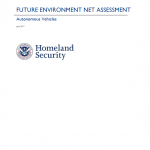
Autonomous vehicles collect and process data from their environments, taking actions that can either help or replace drivers. OCIA assesses that these vehicles will benefit society by improving road safety and reducing deaths, injuries, and costs associated with collisions. Autonomous vehicles will also likely lead to a decrease in traffic congestion, decreasing fuel consumption and emissions per mile, and helping save drivers’ money and time. However, as vehicles become increasingly connected and a part of the Internet of Things, vulnerabilities and potential consequences are likely to increase unless cybersecurity is better integrated into vehicle design and development. Legal and regulatory gaps exist on issues such as collision liability and safety standards; if these gaps are not addressed, cities and states might implement their own laws and regulations, creating inefficiencies for automobile manufacturers, shipping companies, and drivers. Moreover, fully autonomous vehicles will likely have an adverse effect on the professional driver workforce when bus, taxi, and truck drivers are eventually replaced.
